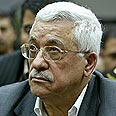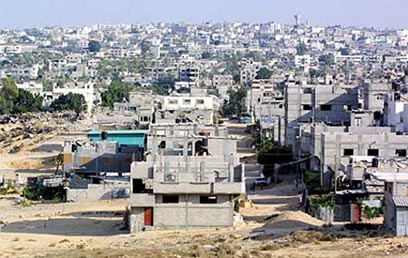
Abbas: The big jihad is construction
Palestinian leader says no compromise on Temple Mount; committed to 'two states, Israel and Palestine, living side by side in peace,' in interview with Israeli Arab newspaper
Palestinian Authority Chairman Mahmoud Abbas said that he was committed to seeing "two states" live side by side in peace, in an interview with an Israeli Arab paper on Friday. However, Abbas said that he "excluded" the division of authority over the Temple Mount.
“The big jihad is the jihad of construction. We want to rebuild our homeland from new, and we will fight for the arrival of peace. If there will be peace between us, there will peace in the whole area and in the world, because the whole world sees the Palestinian problem as the source of the conflict,” said Abbas.
The Palestinian leader was speaking to the Israeli Arab newspaper, Kol al-Arab.
In the course of the interview, Abbas described Israeli Arabs as “the Palestinians who are inside.”
“They have been decreed to live in this place,” he said.
“They are different from the rest of the nation in that they carry Israeli citizenship, and that’s not a source of shame. There are Palestinians who have many different citizenships, including American, British, Jordanian, and others. You did well when you flew the banner of peace and equality. Through your campaign, you realized part of your national aspirations. Part of the nation will win independence in an independent nation, and the other part is working for equality. I urge you to continue your struggle.”
'Refugees'
Abu Mazen also spoke about the rehabilitation of refugee camps, and reflected on the connection between that process and he what he called "the excuse" of maintaining the issue of refugees.
“There are refugees who live in very difficult economic and societal conditions,” said Abbas. “I wonder how long residents of the refugee camps will continue to suffer for the excuse that the Palestinian refugee problem won’t be forgotten. In my view, improving the living standard of the refugees won’t cause the national feelings of the refugees to disappear. We’ve begun preparing programs on this issue through meetings with the U.N., and this has stepped up a gear after the disengagement.”

Khan Younis, Gaza (Photo: Dani Solomon)
Speaking of his policies for the future, Abbas said, “We demand nothing less and nothing more than what was agreed upon in the Road Map. We want the program to be applied to the letter. We initiated a period of calm among all the Palestinian factions to give the political process a chance, and one of the results of this policy has been the complete clearance of settlements and soldiers from Gaza within a month. The territories left by settlers will be the inheritance of the Palestinian nation, and the area will benefit accordingly.”
'We don't want more than Bush'
When asked what he thought would be the next step after the disengagement plan, Abbas said, “We are living in the first stage right now, which is the withdrawal from Gaza and the northern West Bank, but we are expecting more steps and further withdrawals from the rest of the West Bank and Jerusalem. We don’t want more than what president Bush authorized and dreamed of when he said, ‘two independent states, Israel and Palestine, living side by side in peace. We don’t want more than that and therefore we fought against the separation fence and the settlements. These are what we view as the obstacles to peace. The settlement blocs were built on occupied land and what was built illegally will not be recognized by us. The same is true of Jerusalem – we rule out any division of the property and authority over the Temple Mount.”
"After the withdrawal (of Israel from Gaza), we will apply the rest of the agreements discussed at Sharm el-Sheikh such as clearing the cities, and releasing prisoners. Then we will go to the Road Map. In connection with this, I’ll point out that Israel lost an opportunity when it rejected the Arab initiative, in which the countries of the Arab league committed themselves to normalization with Israel in exchange for a full withdrawal from Arab territory,” he said.
Earlier this week, the Palestinian leader instructed the PA to prepare a framework for the disarming of Palestinian factions in Gaza.
When asked about this in the interview, Abbas said, “no one can run away from the fact that there will be one Authority, one armed sovereign body, and a multiplicity of political opinions that will encompass everyone. All the factions committed themselves to the principle of a calming down period, and when the attack in Beer Sheva happened, no one took responsibility for it. This shows how no one is playing games. It’s like with them (the Israelis), a settler goes out and kills in Shfaram or Shilo, we also have people like this. We are committed to continuing along the path of dialogue and persuasion. This is an internal Palestinian problem, let us take care of it our way, and on our own.”
Self destructive conflict
When asked whether he thought the armed conflict against Israel and the losses and damage suffered by Israel are what caused Ariel Sharon to order the pullout from Gaza, Abbas replied: “We have come from five years of intifada. I said then and I still say now, that the balance of power is not in our favor, and the path of dialogue is better than the road of violence, because we are the side that gets damaged more.”
“The war is not an end in itself, and since the Israelis have begun to withdraw, there is no reason to fight. When we were humiliated in the past and no one heard us – we used weapons, but I am telling you that the use of (Qassam) rockets is causing major damage to the Palestinian people. Bet Hanoun, which was the Palestinian fruit basket, has turned into a desert again.”










